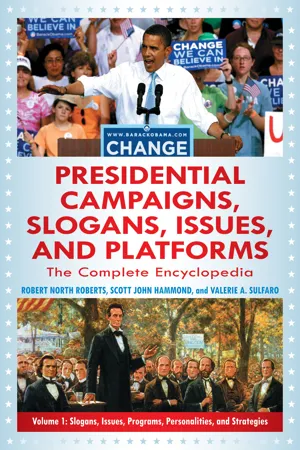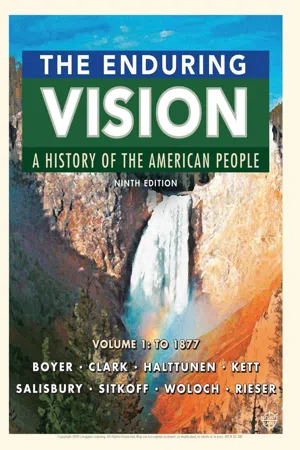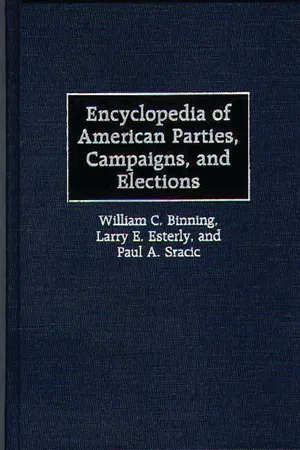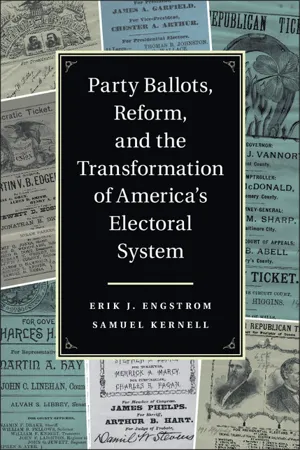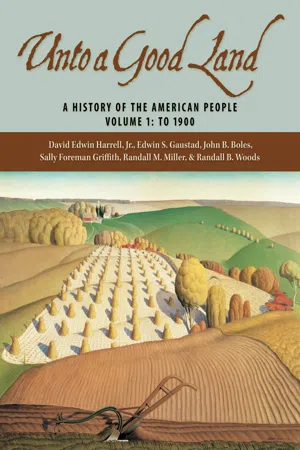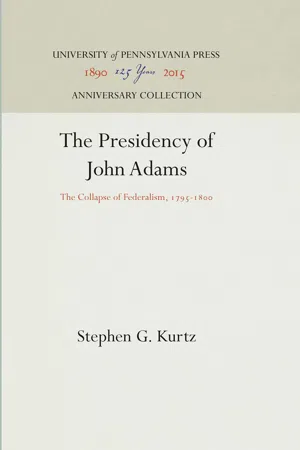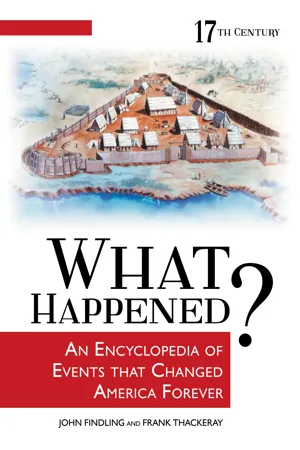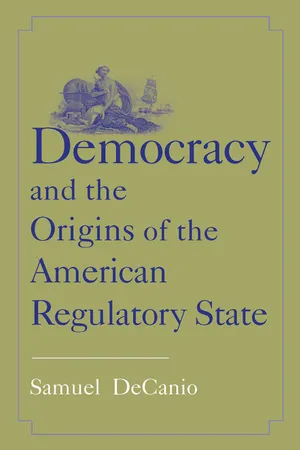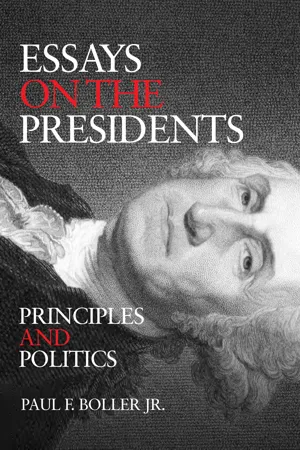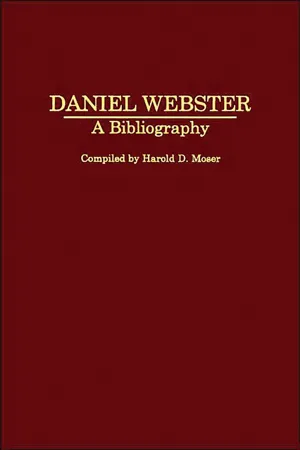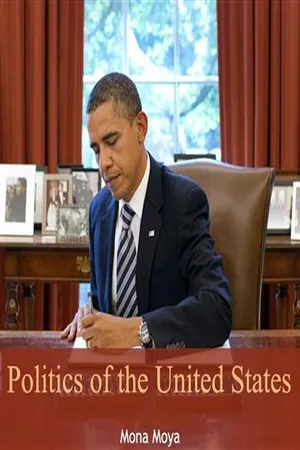History
1828 Presidential Election
The Presidential Election of 1828 was a significant event in American history, marking the rematch between incumbent President John Quincy Adams and his challenger, Andrew Jackson. Known for its intense and negative campaigning, the election saw Jackson emerge victorious, becoming the 7th President of the United States. This election is often remembered for its role in shaping modern political campaigning.
Written by Perlego with AI-assistance
Related key terms
1 of 5
11 Key excerpts on "1828 Presidential Election"
- eBook - ePub
Presidential Campaigns, Slogans, Issues, and Platforms
The Complete Encyclopedia [3 volumes]
- Robert North Roberts, Scott John Hammond, Valerie A. Sulfaro(Authors)
- 2012(Publication Date)
- Greenwood(Publisher)
Given the storm and stress of the campaign, the actual election was anticlimactic. Jackson won impressively in the popular vote: between 642,000 and 647,000 (around 55%–56%) going for Jackson, with somewhere between 500,000 and 508,000 (43%–44%) votes for the incumbent president. Jackson’s margin of victory among the popular vote would stand as the highest in the nineteenth century. Reflecting the popular will, the Electoral College this time gave Jackson a decisive majority: 178 electoral votes to 83 (or 68% for Jackson to 32% for Adams). President Adams held all six New England states as anticipated and also won in New Jersey, Delaware, and Maryland, the Maryland vote being nearly split—6–5 in favor of Adams. Even though Adams lost in New York, he managed to pluck 16 of the Empire State’s 36 electoral votes, Jackson still winning a majority of 20. There was nothing left to question this time around; Andrew Jackson was decisively the president-elect. Three candidates received votes for vice president: the incumbent Calhoun, easily winning reelection with 171 votes and following the example of New York’s George Clinton by becoming, along with Clinton, historically one of two vice presidents to serve two different presidents (Clinton having served under both Jefferson and Madison). Adams’s Secretary of the Treasury, Richard Rush of Pennsylvania, received 83 vice presidential votes for the National Republicans, and William Smith of South Carolina won seven votes from the Georgian delegation as a protest against Calhoun’s mistreatment of native son William Crawford when the two men worked together in the Monroe administration. It would not be the first time that Calhoun was the object of personal retribution.The election of 1828 is often regarded by historians, political scientists, and students of electoral politics as the watershed event in the democratizing of presidential selection. To an extent this is accurate, as the election was characterized by what was at the time unprecedented citizen participation. But it is also misleading to an extent, as presidential elections had been gradually and noticeably moving in this direction for two decades. Whether or not historians can arrive at a clear enough understanding of this era to satisfy all the angles, the election of Andrew Jackson to the presidency definitely pointed the country toward the formal institutionalization of the modern two-party system and helped to establish the shape of things to come. Furthermore, Jackson’s triumphs in 1828 and later in 1832 assembled and solidified a varied coalition within the Democratic Party that included the allegiance of aristocratic southern planters (and thus slave owners), western entrepreneurs, small farmers in the West as well as in the North, and diverse immigrants residing in larger numbers within the more heavily populated cities, particularly in the North. In a word, Jackson’s ascent relied upon the first of many “coalitions” that would help to define the Democratic Party throughout much of its history. For these and other reasons, President Jackson would greatly contribute to the formation of the American political system that we know today. Indeed, the fact that these events opened what is now universally called “the Age of Jackson” speaks volumes with regard to his pivotal role in American history. And indeed, in many ways it was indeed Jackson’s age, but it is only fair to remark that former president John Quincy Adams was not nearly finished with public life. President Adams may have left the executive branch under unfavorable conditions, but he would soon eagerly return to the public arena, serving with distinction in the House of Representatives, wherein he his colleagues assigned him the nickname “Old Man Eloquent” due largely to his speeches condemning slavery, and thereby earning a name as one of the preeminent American statesmen in any era. And President Jackson’s legend survived the mudslinging barrage of 1828 and continued to loom larger than life through the duration of his presidency and beyond. - No longer available |Learn more
The Enduring Vision
A History of the American People, Volume 1: To 1877
- Paul Boyer, Clifford Clark, Karen Halttunen, Joseph Kett(Authors)
- 2017(Publication Date)
- Cengage Learning EMEA(Publisher)
spoils system The practice of basing appointments on party loyalty. Southerners protested U.S. participation in the pan-American conference because it included regimes that had abolished slavery, including the black republic of Haiti, created by slave revolutionaries. At the midterm congressional elections of 1826 and 1827, Adams’s opponents took control of both houses of Congress. While Adams continued to practice a time-honored politics of courting regional leaders so they would deliver the votes of their followings, his opponents— most important, Martin Van Buren of New York— were inventing a new grassroots politics based on organization and partisan loyalty. 10-1.3 The Rise of Andrew Jackson and the Election of 1828 As President Adams’s popularity declined, Andrew Jackson’s rose. While seasoned politicians distrusted his notoriously hot temper and his penchant for duels, Jackson was still a popular hero for his victory over the British in the Battle of New Orleans. And because he had fought in the American Revolution as a boy, Jackson seemed to many Americans a living link to a more virtuous past. The presidential campaign of 1828 began almost as soon as Adams was inaugurated in 1824. The Democratic-Republicans began amassing support for Jackson for president and Calhoun for vice presi-dent. By the 1828 election, the party would rename itself simply the Democratic Party . Its opponents, the National Republicans, rallied behind Adams and his running mate, treasury secretary Richard Rush. Jackson’s supporters began to put together a modern political machine based on local committees and state conventions, partisan newspapers, and public rallies. Two years before the election of 1828, towns and villages across the United States were buzzing with political activity and debate between “Adams men” and “Jackson men.” The second American party system was beginning to take shape. The 1828 campaign was a vicious, mudslinging affair. - William C. Binning, Larry E. Esterly, Paul A. Sracic(Authors)
- 1999(Publication Date)
- Greenwood(Publisher)
Page 106 1828 Democratic Party nominee: Andrew Jackson, 56% National Republican Party nominee: John Quincy Adams, 44% This election marked the formal return of twoparty politics to the United States. The Republicans, who had also been known as the DemocraticRepublicans, formally divided into the Democratic and the National Republicans. The alleged corrupt bargain that had placed the incumbent John Quincy Adams into office doomed his chances for reelection. The very notion that Adams could become president while Andrew Jackson had garnered a plurality of the popular votes cast for electors was seen as antidemocratic, and democracy was on the rise in 1828. Only two states (Delaware and South Carolina) did not allow for the popular election of presidential electors. Adams, as he had demonstrated in the election of 1824, was not a candidate who could appeal to the masses. Moreover, the National Republicans, unlike their rivals the Democrats, were not organized at the local level. Jackson’s party understood how to appeal to the general public, an absolute necessity by the late 1820s. The 1828 campaign was probably the longest (and arguably the nastiest) campaign that the United States has ever seen. The campaign began in 1825, when the Tennessee legislature nominated Andrew Jackson for president. There was never any serious doubt that John Quincy Adams would be once again the National Republicans’ choice. In fact, at the National Republican Convention in Pennsylvania (the most prominent of several state conventions) Adams was not even formally nominated. Instead, the Pennsylvania convention selected Richard Rush as the party’s vicepresidential candidate. It was necessary to select a new vicepresidential candidate inasmuch as the incumbent, John C. Calhoun, had joined forces with Jackson. Another National Republican, John Andrew Shulze of Pennsylvania, also received one state’s nomination for vicepresident.- Erik J. Engstrom, Samuel Kernell(Authors)
- 2014(Publication Date)
- Cambridge University Press(Publisher)
2 The Puzzle of Responsive Elections The presidential election of 1880 is most often remembered for its violent aftermath. The assassination of President James Garfield, just six months into his administration, by a jilted job seeker, casts a long historical shadow over the election. But what many political scientists will find more intriguing about 1880 is the election itself. It featured one of the highest voter turnouts – 80 percent of eligible voters – and narrowest presidential vote margins in American history. The 8 million presidential votes broke in favor of Garfield by just more than 2,000, yet they were distributed efficiently, allowing him to eke out a narrow Electoral College majority and keep the White House under Republican control. But perhaps the election’s most remarkable feature is the breadth of the Republican victory in Congress and across the nation. Republicans retook control of the House of Representatives for the first time since 1872. Whether Republicans would wrest control of the Senate from Democrats would not be officially decided until the state legislatures convened the following January. Yet Republicans had ample cause for optimism. Of the twenty-seven non-Southern state legislatures elected that year, Republicans won a majority in both legislative chambers in twenty states and split control in two others. Among these wins were bicameral majorities in six legislatures served by lame-duck Democratic senators. Early the following year the final wave of the Republican victory lapped into Washington with the election of the narrowest possible Senate majority – that is, requiring the Republican vice president’s tie-breaking vote. Considering the Framers had carefully designed the upper chamber to withstand “impetuous” swings of public sentiment by staggering terms and setting up indirect elections, these results are all the more striking. And yet we can see in Table 2.1 that this outcome was unexceptional for the era.- eBook - ePub
Unto a Good Land
A History of the American People, Volume 1: To 1900
- David Edwin Harrell, Edwin S. Gaustad, John B. Boles, Sally Foreman Griffith(Authors)
- 2005(Publication Date)
- Eerdmans(Publisher)
Thus understood, parties derived their power from the people, and it followed that party leaders were bound to obey the dictates of the party. In theory, such parties stood for the interests of a broad cross-section of the populace. Unlike European parties that were responsible to aristocratic cliques, and unlike older conceptions of Anglo-American parties that represented narrow interests, the new idea of the party was a means of embodying democratic intent — expressing the voice of the people. And, particularly after the Missouri Crisis of 1819 had threatened a North-South rending of the Union, the idea of broad parties binding people together across a wide range of issues seemed an antidote to what Van Buren called “geographical differences founded on local instincts or what is worse, prejudices between free and slaveholding states.” Well-disciplined parties could safely channel political differences, and party organizations, newspapers, and spokespeople could use such differences to weld together the kind of group identification that mobilized voters and influenced government policies. As a state legislator and then New York State attorney general before he went to Washington in 1821 as a Senator, Van Buren revolutionized his state’s politics. In Monroe’s last years as president, the Little Magician prepared to bring what became known as mass political participation to the national arena, a process that would eventually yield what historians now call the Second Party System. Van Buren recognized that political parties were essential to a democracy, and that insight — more than the rather dismal results of his own presidential administration (1837-1841) — makes him a great figure in American political history.The Election of Andrew Jackson
The “Old Hero,” Andrew Jackson, had already proven himself a master of the new politics of symbolism. As Indian fighter, British basher, enemy of big government, and straight-talking representative of the plainfolk pioneers of the West, he took the nation by storm. Martin Van Buren, who understood the new style of politics better than anyone else at the time, served as Jackson’s campaign manager. Van Buren saw to it that in countless towns and village crossroads, Jackson supporters — who shortened their party name from Democratic-Republican to Democratic — came to identify their candidate (a veritable force of nature, they called him), with freedom and equality of opportunity (for whites only) and hundred-proof democracy. In Pennsylvania, where an embryonic party machinery had already been created and the caucus method of choosing a presidential candidate had been rejected, the popularly elected convention delegates unanimously picked Old Hickory as their presidential candidate. Jackson’s party managers like Van Buren were masters of the emerging political system, and with blockbuster states like New York and Pennsylvania in their camp, Jackson’s election looked certain.Jackson for President - eBook - PDF
The Presidency of John Adams
The Collapse of Federalism, 1795-18
- Stephen G. Kurtz(Author)
- 2017(Publication Date)
4 The Candidates of 1796 HAVING SETTLED THE GREAT FOREIGN POLICY ISSUE OF WASH-ington's second administration, the politicians turned with what must have been a sense of profound relief to the more familiar arguments and devices of electioneering. T h e third presidential contest in the history of the United States, while it was fought out by party organizations that had arisen in response to the administration program, was nevertheless de-cided by what were primarily local or regional issues. T h e President would be chosen only indirectly by the people, and whether Federalists or Republicans would prove vic-torious in state contests for the electoral college often rested on nothing more than the popularity of local politicians. Regional loyalties were stronger than devotion to the new Federal compact, the sense of nationality was yet unde-veloped, and the isolation of most communities such that mo-mentous national issues roused far less interest than the sea-board and urban newspapers of the time imply. Perhaps the most important single factor in the contest (if newspaper sources may be trusted at all) was the personal popularity of the candidates for high office. T h e election of 1796 was vigorously contested, because for the first time opponents of the administration saw a chance to win. Washington was expected to retire from public life, and as the new year opened one of the men most vitally concerned with that eventuality was already contemplating its consequences. 78 The Candidates of ¡796 79 In perfect secrecy between you and me, wrote John Adams to his wife, I must tell you that I now believe the President will retire. The consequence to me is very serious, and I am not able, as yet, to see what my duty will demand of me. Adams concluded that he could only wait, watching the events of the next few moments with close scrutiny, in the hope that Providence would show the way. - eBook - PDF
- John E. Findling, Frank W. Thackeray, John E. Findling, Frank W. Thackeray(Authors)
- 2010(Publication Date)
- ABC-CLIO(Publisher)
This campaign was the first in which personal attacks played a role. Jackson’s campaign spread the word that Adams had installed a billiards table and a chess set in the White House and claimed that the White House now con- tained “gaming tables and gambling furniture.” Adams’ campaign retaliated with tales about Jackson’s frontier brawls and, worse, Jackson’s alleged premarital relations with the woman he later married. Possibly because of the stress of these personal attacks, Jackson’s wife died soon after the election and never lived in the White House. Adams had not had a very successful presidency, and that, combined with Jackson’s heroic military exploits, was enough to carry the day. Jackson won states in every re- gion of the country and, to use the present-day term, clearly won a national “mandate” to govern. And with Jackson’s highly personalized presidency came that which is known as Jacksonian democracy. The process of democratization that is central to Jacksonian democracy was clear in the election itself. Between and , six new states had entered the union with constitutions that contained no property qualifications for voting; other states 110 WHAT HAPPENED? liberalized their qualifications. The result was that the number of voters increased from just , in to . million in . Over the next years, the number voting jumped to nearly million, an increase far greater than can be accounted for by popu- lation growth. In more general terms, other changes were accomplished in the political system. The increase in population in the West, along with the economic distress that followed the panic of , showed the need for electing officials who would represent the true inter- ests of the majority. Through the growth of free public education and a cheap press dur- ing this time, the common man became much more aware of the political system and what it could do to protect or advance his opportunities in society. - Samuel DeCanio(Author)
- 2015(Publication Date)
- Yale University Press(Publisher)
78 Chapter 5 The Election of 1868 While the Ohio election of 1867 did not directly involve national political debates, the election influenced both parties’ calculations regarding the policies and candidates they would endorse in the presidential election of 1868. The Ohio election had increased the sa-lience of the currency issue and caused a shift in the parties’ financial platforms, as the Republicans were increasingly defending the gold standard while the Democrats became more amenable to currency inflation. These positions marked the beginning of the public’s association of the Republican Party with Eastern “money power” and support for the gold standard, associations that would be maintained for decades. Conversely, the Democrats, and social movements and third parties such as the Greenback Party, the Grange, the Farmers’ Alliance, and the Populists that emerged in the 1870s and 1880s, would eventually adopt greenback doctrines that had previously been associated with the Whigs and the Radical Republicans. Aside from structuring postbellum economic debates, these shift-ing partisan positions would lead to institutional transformations The Election of 1868 79 that would alter the nature of the American state. These institutional innova-tions are discussed in later chapters; this chapter examines how the Ohio elec-tion of 1867 influenced national politics, the presidential election of 1868, and the evolving monetary positions of the Democratic Party. This chapter’s discussion of the parties’ shifting monetary positions is nec-essary for explaining the subsequent incarnation of inflationary monetary policy, namely the rise of the free silver issue, and for explaining why certain Republicans endorsed bureaucratic delegation to insulate monetary policy from popular control. Unlike other chapters, this chapter examines the par-ties’ shifting monetary positions during the election of 1868, and does not focus on explaining how voter ignorance influenced politics.- eBook - ePub
Essays on the Presidents
Principles and Politics
- Paul F. Boller(Author)
- 2013(Publication Date)
- TCU Press(Publisher)
Public-spirited men did not seek office; the office sought them. Washington was the ideal leader; his character, exclaimed the Massachusetts Centinel, was a “TISSUE OF VIRTUES.” But the rise of political parties, not contemplated by the constitution-makers, posed a threat to the self-recusing rules for men eligible for the presidency. Political parties, which emerged during Washington’s second administration, chose candidates for president, launched vigorous efforts on their behalf, utilized stump speakers on the state and local levels, and did not hesitate to denigrate their opponents. The first real presidential campaign came in 1796, with John Adams the candidate of the Federalist Party and Thomas Jefferson the choice of the Republicans, and it contained a great deal of mudslinging the Founding Fathers had hoped to avoid in contests for the presidency. Neither Adams nor Jefferson did any electioneering, but unlike Washington, they followed with interest the work of the parties on their behalf (especially Adams), and made no effort to restrain the party excesses. Adams won, but four years later, when he faced Jefferson again, both candidates—Jefferson in particular this time—were active behind the scenes. After 1800, it became acceptable for presidential candidates to keep in touch with party workers during their campaigns, and to make known their political views through letters accepting their nominations and through communications to party leaders, which were released to the press. In 1828, Andrew Jackson was tirelessly busy behind the scenes organizing his forces and directing the campaign to put him in the White House, but he refrained (or was restrained by party leaders) from making any public remarks that could be construed as attempts to push his own cause. When the Davidson County Bible Society invited him to speak on the occasion of one of its anniversaries, he politely declined - eBook - PDF
Daniel Webster
A Bibliography
- Harold D. Moser(Author)
- 2005(Publication Date)
- Praeger(Publisher)
Boston: Little, Brown and Company, 1945, 1950, 1953. A classic study of the Jacksonian era; essential for understanding the historiography of the period for the last fifty years. 2476. Schlesinger, Arthur M., Jr. The Imperial Presidency. Boston: Houghton Mifflin, 1973. Explores the evolution of the American presidency; brief discussion of DW's views on office. 2477. Schmidhauser, John R. "Judicial Behavior and the Sectional Crisis of 1837-1860." Journal of Politics 23 (November 1961): 615-40. 2478. Schroeder, John H. Shaping a Maritime Empire: The Commercial and Diplomatic Role of the American Navy, 1829-1861. Westport, Conn.: Greenwood Press, 1985. 2479. Schroeder, John Herman. "Virginia Whig Leadership, 1834-1842." M.A. thesis, University of Virginia, 1967. 2480. Schwartz, Bernard. From Confederation to Nation: The American Constitution, 1835-1877. Baltimore: Johns Hopkins University Press, 1973. 2481. Sellers, Charles G. "Who Were the Southern Whigs." American Historical Review 59 (January 1954): 335-46. Emphasizes the commercial nature of the Whig coalition. 294 Daniel Webster: A Bibliography 2482. Seventy-Niner. "An Anecdote of Daniel Webster." Century 47 (January 1894): 477-78. Recounts occasion in Philadelphia when DW delivered speech at the Musical Fund Hall in opposition to the removal of the deposits. 2483. Sewell, Richard H. "John P. Hale and the Liberty Party, 1847-1848." New England Quarterly 37 (June 1964): 200-223.. 2484. Shalhope, Robert E. "Jacksonian Politics in Missouri: A Comment on the McCormick Thesis." Civil War History 15 (September 1969): 210-25. 2485. Sharp, James Roger. "Andrew Jackson and the Limits of Presidential Power." Congressional Studies 7 (Winter 1980): 63-80. Explores background of the 1834 censure of Jackson and contends that censure is the only alternative when impeachment is politically impossible. - No longer available |Learn more
- (Author)
- 2014(Publication Date)
- College Publishing House(Publisher)
Political consequences of Federalist opposition to the War of 1812 as well as other factors first reduced the Federalist Party to merely local significance, and ultimately to total disappearance. The Era of Good Feelings thus marked a brief period in which only one party, the Democratic-Republican party, was significant at the Federal level. ______________________________ WORLD TECHNOLOGIES ______________________________ Second Party System In 1824,1828, The Second Party System saw a split of the Democratic-Republican Party into the Jacksonian Democrats, who grew into the modern Democratic Party, led by Andrew Jackson, and the Whig Party, led by Henry Clay. The Democrats supported the primacy of the Presidency over the other branches of government, and opposed the Bank of the United States as well as modernizing programs that they felt would build up industry at the expense of the taxpayer. The Whigs, on the other hand, advocated the primacy of Congress over the executive branch as well as policies of modernization and economic protectionism. Central political battles of this era were the Bank War and the Spoils system of federal patronage. The 1850s saw the collapse of the Whig party, largely as a result of deaths in its leadership and a major intra-party split over slavery as a result of the Compromise of 1850. In addition, the fading of old economic issues removed many of the unifying forces holding the party together. ċ Third Party System The Third Party System stretched from 1854 to the mid 1890s, and was characterized by the emergence of the anti-slavery Republican Party, which adopted many of the economic policies of the Whigs, such as national banks, railroads, high tariffs, homesteads and aid to land grant colleges. Fourth Party System The Fourth Party System, 1896 to 1932, retained the same primary parties as the Third Party System, but saw major shifts in the central issues of debate.
Index pages curate the most relevant extracts from our library of academic textbooks. They’ve been created using an in-house natural language model (NLM), each adding context and meaning to key research topics.
